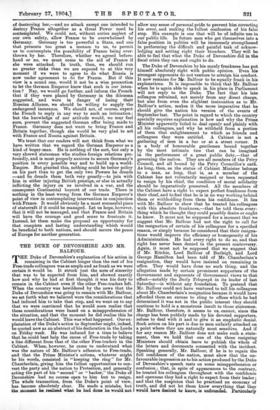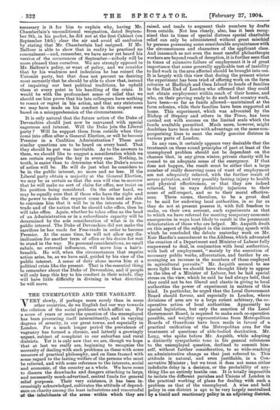THE DUKE OF DEVONSHIRE AND MR. BALFOUR. T HE Duke of
Devonshire's explanation of his action in remaining in the Cabinet longer than the rest of his Free-trade colleagues was as ample and as frank as we were certain it would be. It struck just the note of sincerity that was to be expected from him, and showed exactly how and why he had at first thought it was his duty to remain in the Cabinet even if the other Free-traders left. When the country was bewildered by the news that the Duke of Devonshire was going to remain with Mr. Balfour, we set forth what we believed were the considerations that had induced him to take that step, and we went on to say that we were convinced that he would soon realise that these considerations were based on a misapprehension of the situation, and that the moment he did realise this he would leave the Cabinet. This was what happened. Our ex- planation of the Duke's action in September might, indeed, be quoted now as an abstract of his declaration in the Lords on Friday week. He was induced for a time to believe that he could best help the cause of Free-trade by taking a line different from that of the other Free-traders in the Cabinet. When, however, he came to understand what was the nature of Mr. Balfour's adhesion to Free-trade, and that the Prime Minister's actions, whatever might be his words, consisted in "keeping the ring" for Mr. Chamberlain, giving him the fullest opportunities to con- vert the party and the nation to Protection, and generally acting the part of his " second " or "backer," the Duke of Devonshire had no course open to him but to resign. The whole transaction, from the Duke's point of view, has become absolutely clear. He made a mistake, but the moment he realised what he had done he would not allow any sense of personal pride to prevent him correcting his error, and making the fullest confession of his false step. His example is one that will be of infinite use in our public life. In future men who get themselves into a false position in politics will be immensely strengthened in performing the difficult and painful task of acknow- ledging and setting right their blunders. They will be able to feel that what the Duke of Devonshire did in the fiscal crisis they can and ought to do.
The Duke of Devonshire by his manly frankness has put himself absolutely right with public opinion. Even his strongest opponents do not venture to arraign his conduct. It now remains for M. Balfour to be equally frank in his explanations. It is impossible to think that Mr. Balfour when be is again able to speak in his place in Parliament will not reply to the Duke. The fact that his late colleague refrained, not merely from any direct charge, but also from even the slightest insinuation as to Mr. Balfour's action, makes it the more imperative that he should give the nation his version of the events of September last. The point in regard to which the country specially requires explanation is how and why the Prime Minister apparently failed to deal openly and plainly with all his colleagues, and why he withheld from a portion of them that enlightenment to which as friends and colleagues they were entitled. A Cabinet is not a gathering of men in a bar or at a street corner. It is a body of honourable gentlemen bound together by the most intimate ties that can be imagined in the performance of a great public duty,—that of governing the nation. They are all members of the Privy Council, and all bound by the Privy Councillor's oath. As long, then, as the status of Cabinet Minister belongs to a man, as long, that is, as a member of the Cabinet has not voluntarily resigned or been requested to resign by his chief, the condition of moral solidarity should be imperatively preserved. All the members of the Cabinet have a right to expect perfect frankness from their chief, and to feel that he is in no way working behind them or withholding from them his confidence. It lies with Mr. Balfour to show that he treated his colleagues with this absolute frankness,—that he told them every- thing which he thought they could possibly desire or ought to know. It must not be supposed for a moment that we suggest that Mr. Balfour had not the right to call for the resignation of certain of his colleagues for a specified reason, or simply because he considered that their resigna- tions would improve the efficiency or homogeneity of his Administration. He had every right to do so, and that right has never been denied in the present controversy. Again, it must not be supposed that we suggest that if Mr. Ritchie, Lord Balfour of Burleigh, and Lord George Hamilton had been told of Mr. Chamberlain's resignation, they would have insisted on remaining in office. They would have done no such thing, and the allegation made by certain prominent supporters of the Government and exponents of Government views to that effect—notably the Daily Telegraph in its leader of last Saturday—is without any foundation. To pretend that Mr. Balfour could not have ventured to tell his colleagues about Mr. Chamberlain's resignation because it would have afforded them an excuse to cling to offices which he had determined it was not in the public interest they should continue to hold is a monstrous insult to those statesmen. Mr. Balfour, therefore, it seems to us, cannot, since the charge has been publicly made by his devoted supporters, refuse to deal with it and to give it an emphatic denial. Such action on his part is due to men unfairly attacked on a point where they are naturally most sensitive. And if for any reason Mr. Balfour does not make such a state- ment, then we hold that one of the three resigning Ministers should obtain leave to publish the whole of the letters and documents connected with the incident. Speaking generally, Mr. Balfour, if he is to regain the full confidence of the nation, must show that the un- favourable impression as to his action produced by the Duke of Devonshire's speech rests on some misapprehension or confusion ; that, in spite of appearances to the contrary, he treated his colleagues throughout with the confidence and openness they had a right to expect from their leader ; and that the suspicion that he practised an economy of truth, and did not let them know everything that they would have desired to know, is unfounded. Particularly necessary is it for him to explain why, having Mr. Chamberlain's unconditional resignation, dated Septem- ber 9th, in his pocket, he did not at the first Cabinet (on September 14th) clear the air and avoid all confusion by stating that Mr. Chamberlain had resigned. If Mr. Balfour is able to show that in reality he practised no concealment—and, remember, we have never yet heard his version of the occurrences of September—nobody will be more pleased than ourselves. We are strongly opposed to Mr. Balfour's policy, or want of policy, and we consider that by his weakness and indecision he has ruined the Unionist party, but that does not prevent us desiring most earnestly that he should be able to show that, instead of impairing our best political traditions, he upheld them at every point in his handling of the crisis. It would be with the profoundest sense of relief that we should see him prove that his late colleagues have nothing to resent or regret in his action, and that any strictures we may have made on his conduct in this respect were based on a misapprehension of the circumstances.
It is only natural that the future action of the Duke of Devonshire should just now be canvassed with special 'eagerness and interest. Will the Duke join the Liberal party ? Will he support them from outside when they 'come into office after a General Election, or will he become Premier in a Coalition Administration ? These and 'similar questions are to be heard on every hand. That they should be put was inevitable. As to the answers to them, we should like to suggest a consideration which we are certain supplies the key in every case. Nothing, in truth, is easier than to determine what the Duke's course of action will be. He will do just what he considers to be in the public interest, no more and no less. If the Liberal party obtain a majority at the General Election, we may be as certain as that the sun will rise to-morrow that he will make no sort of claim for office, nor insist on his position being considered. On the other hand, we may be equally sure that if those who have the right and -the power to make the request come to him and are able 'to convince him that it will be in the interests of Free- 'trade and of the nation that he should take office, then he will take office. Again, whether he takes office as the head of an Administration or in a subordinate capacity will be 'determined by the sole consideration of what is in the public interest. The Duke of Devonshire did not make the sacrifices he has made for Free-trade in order to become Premier. At the same time, he will not allow any dis- inclination for another term of office or his desire for rest to stand in the way. No personal considerations, no small cabals, no external influences, will move him a hair's- breadth. He will, when the circumstances that require action arise, be, as we have said, guided by his view of the 'public interest. A sense of duty alone moves him at a -political crisis like the present. That is the essential thing to remember about the Duke of Devonshire, and if people will only keep this key to his conduct in their minds, they will have little difficulty in divining in what direction he will move.











































 Previous page
Previous page